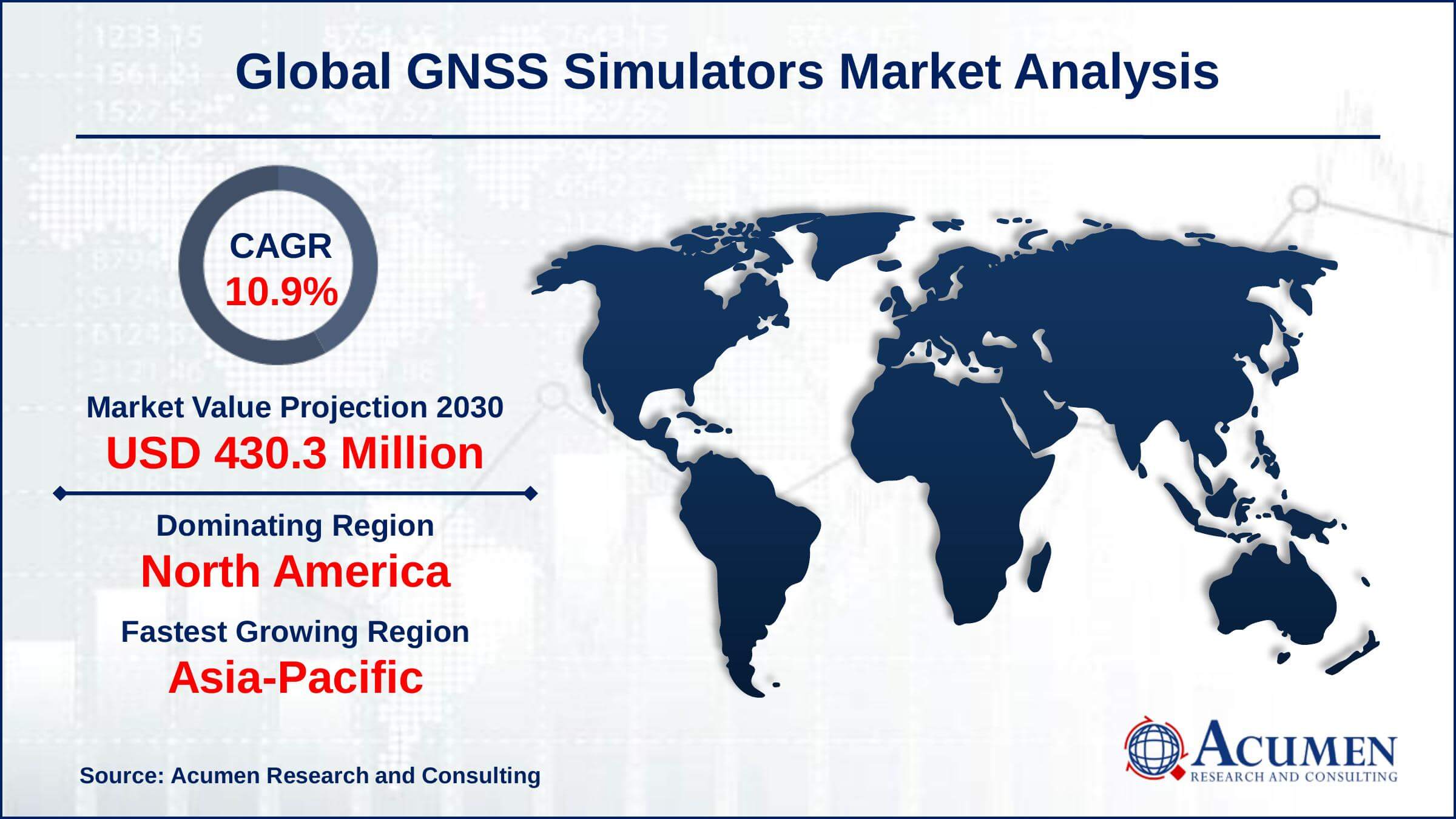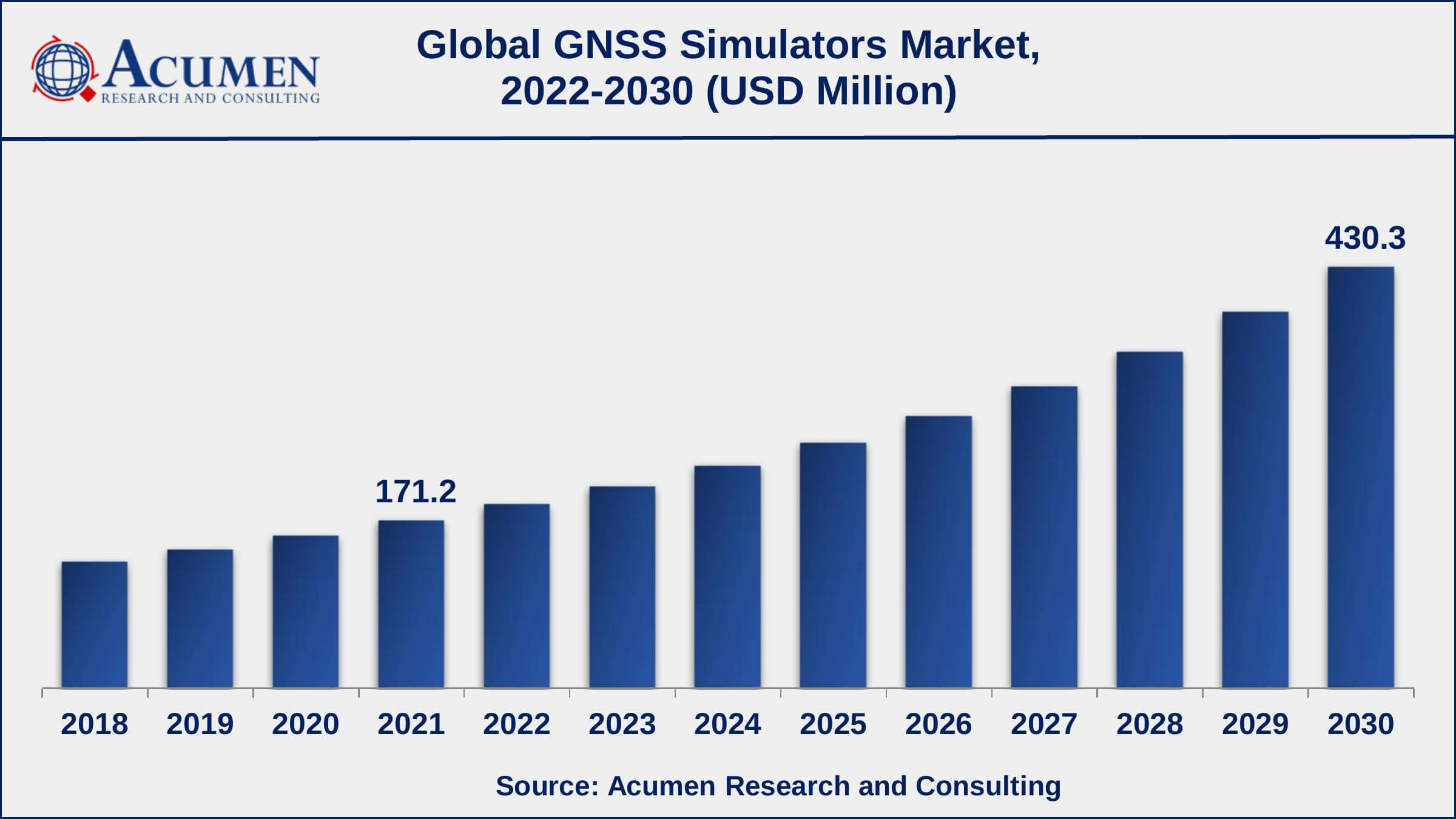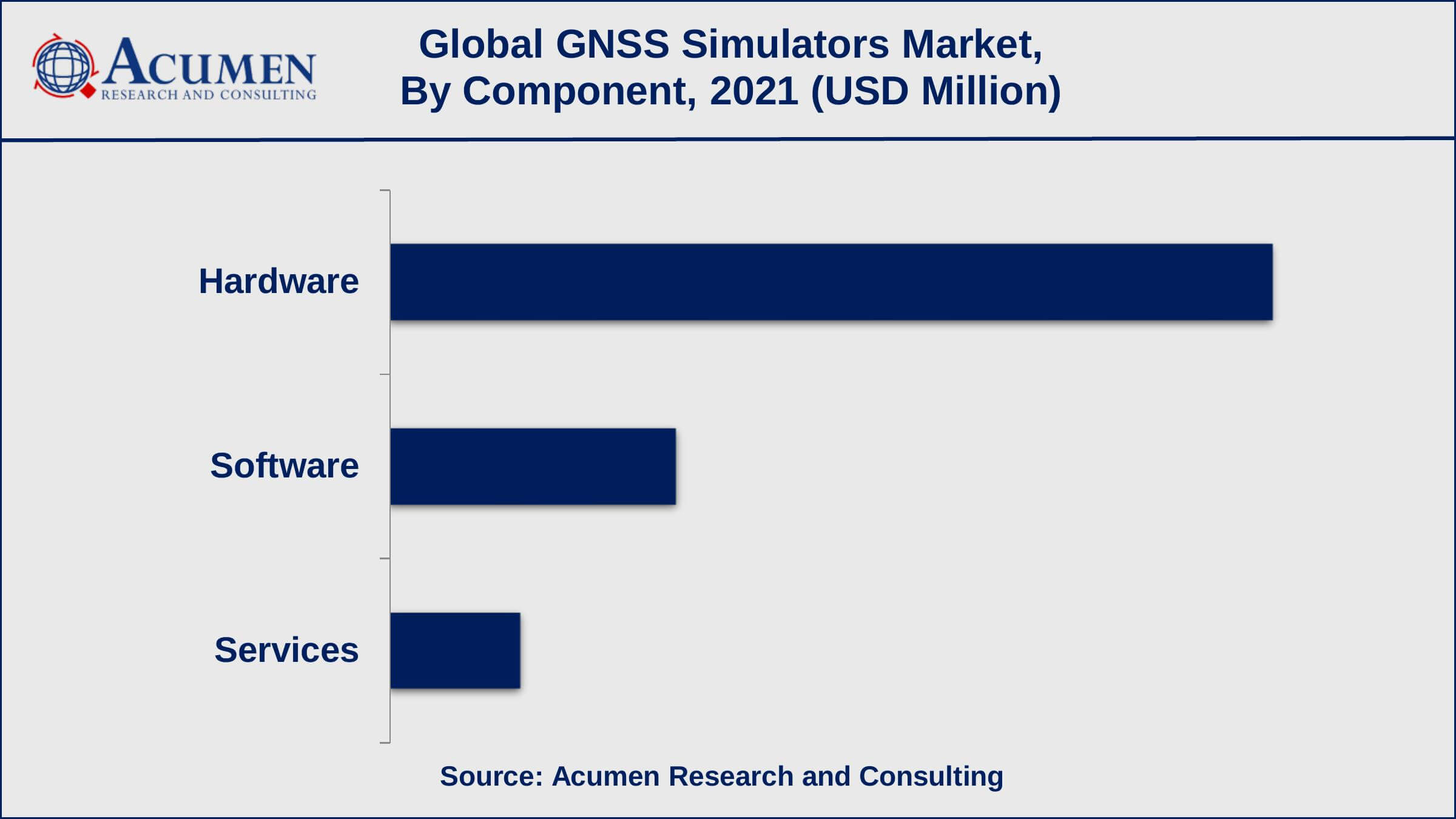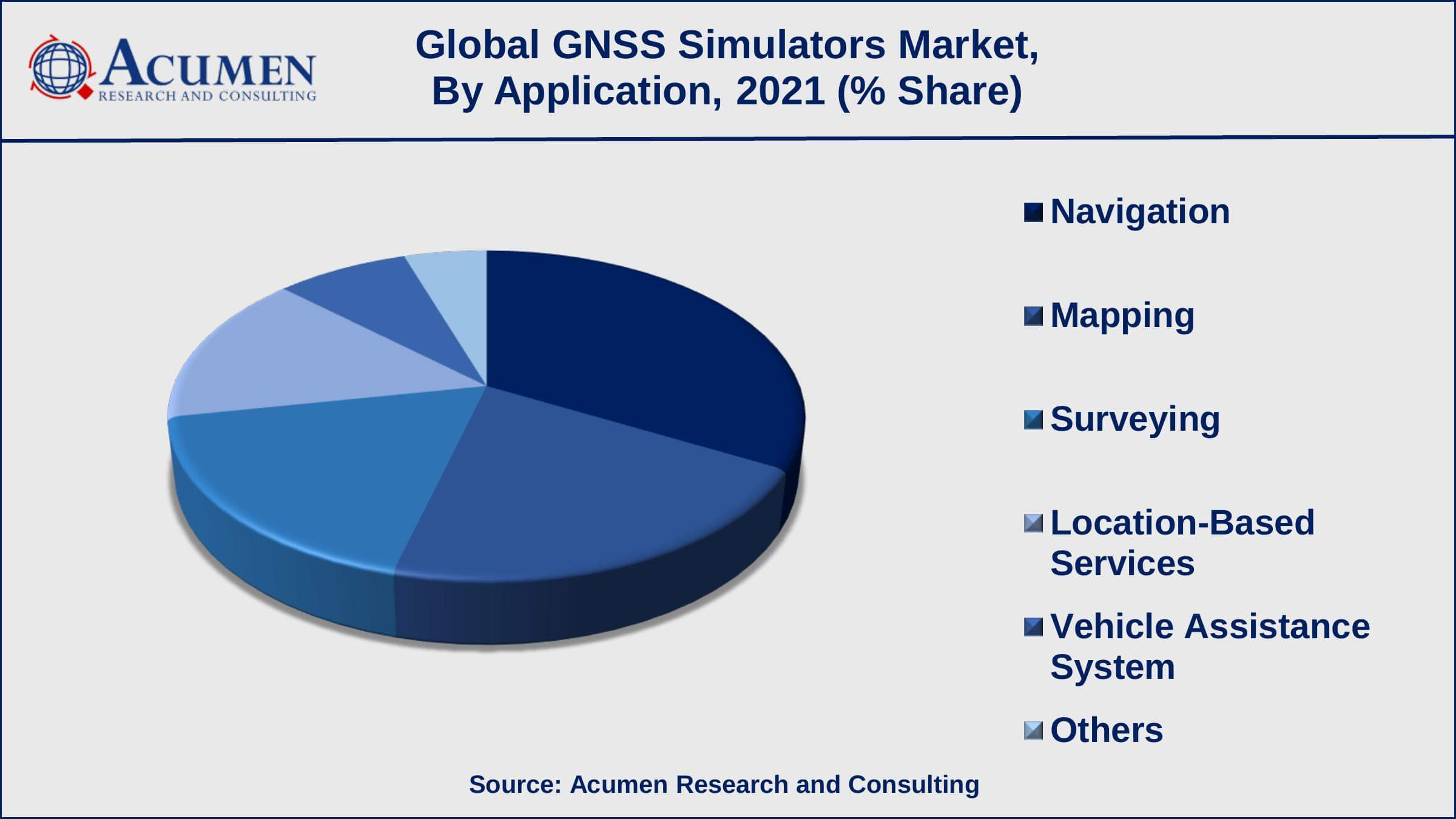Gnss Simulators Market | Acumen Research and Consulting
GNSS Simulators Market Size - Global Industry, Share, Analysis, Trends and Forecast 2022 - 2030
Published :
Report ID:
Pages :
Format :
The Global GNSS Simulators Market Size gathered USD 171.2 Million in 2021 and is set to garner a market size of USD 430.3 Million by 2030 growing at a CAGR of 10.9% from 2022 to 2030.
GNSS (Global Navigation Satellite System) simulators are systems that simulate the behavior of GNSS satellites and the signals they transmit, allowing users to test GNSS-enabled devices and software in controlled laboratory conditions. The importance of GNSS simulators is that they provide a secure environment for testing GNSS-enabled hardware and software, enabling the evaluation of their performance in a variety of scenarios and conditions. Improved accuracy, development and design, cost savings, risk reductions, and interoperability are all key features of GNSS simulators.

GNSS Simulators Market Report Statistics
- Global GNSS simulators market revenue is estimated to reach USD 430.3 Million by 2030 with a CAGR of 10.9% from 2022 to 2030
- North America GNSS simulators market value gathered more than USD 61.6 million in 2021
- Asia-Pacific GNSS simulators market growth will record a CAGR of more than 11% from 2022 to 2030
- Among components, the platform sub-segment collected a 68% share in 2021
- Based on receivers, the GPS sub-segment achieved US$ 56.5 million in revenue in 2021
- The rapid demand for multi-constellation simulators is a popular GNSS Simulators market trend that drives the industry demand

Global GNSS Simulators Market Dynamics
Market Drivers
- Growing demand for GNSS technology
- Surging applications in autonomous vehicles
- Favorable support from the government
Market Restraints
- High cost of these devices
- Lack of awareness
- Regulatory restrictions
Market Opportunities
- Rapid adoption of high-precision GNSS systems
- Growing demand for GNSS in emerging economies
GNSS Simulators Market Report Coverage
| Market | GNSS Simulators Market |
| GNSS Simulators Market Size 2021 | USD 171.2 Million |
| GNSS Simulators Market Forecast 2030 | USD 430.3 Million |
| GNSS Simulators Market CAGR During 2022 - 2030 | 10.9% |
| GNSS Simulators Market Analysis Period | 2018 - 2030 |
| GNSS Simulators Market Base Year | 2021 |
| GNSS Simulators Market Forecast Data | 2022 - 2030 |
| Segments Covered | By Component, By Type, By Receiver, By Application, By Vertical, And By Geography |
| Regional Scope | North America, Europe, Asia Pacific, Latin America, and Middle East & Africa |
| Key Companies Profiled | Spirent Communications, Rohde & Schwarz, Orolia, Hexagon, Syntony GNSS, VIAVI Solutions, Keysight Technologies, u-blox, CAST Navigation, and Accord Software and System. |
| Report Coverage |
Market Trends, Drivers, Restraints, Competitive Analysis, Player Profiling, Covid-19 Analysis, Regulation Analysis |
GNSS Simulators Market Growth Factors
The growing use of GNSS technology in various industries such as automotive, aerospace, and defense is driving the global navigation satellite system simulators market value, as they are essential for the development and testing of GNSS-enabled devices and software. Another factor boosting the GNSS simulator industry is advancements in GNSS technology. The demand for GNSS simulators that can simulate these advanced technologies is expected to rise as GNSS technology evolves and improves.
Growing demand for self-driving cars, which rely heavily on GNSS technology, is also propelling the GNSS simulators market forward. In addition to that, the rising demand for high-precision GNSS systems in applications such as precision farming and surveying is significantly supporting the industry.
The high cost of GNSS simulators is a significant impediment that may limit their adoption among smaller businesses or individual users. Furthermore, GNSS simulators can be complex and require specialized knowledge to operate and use effectively, posing a barrier to entry for some users. However, some potential users may be unaware of the benefits and applications of GNSS simulators, which may limit their adoption.
Furthermore, government support for GNSS technology, such as funding for R&D and procurement of GNSS simulators for military and defense applications, is expected to create significant market growth opportunities in the coming years. As emerging economies increase their investments in GNSS-enabled infrastructure and applications, the demand for GNSS technology is expected to drive growth in the GNSS simulator market.
GNSS Simulators Market Segmentation
The worldwide global navigation satellite system (GNSS) simulators market is categorized based on component, type, receiver, application, vertical, and geography.
GNSS Simulators Market By Component
- Hardware
- Software
- Services
- Managed Services
- Professional Services

As per the GNSS simulators industry analysis, the hardware sub-segment held the majority of the market share in 2021. As the use of GNSS technology expands in industries such as automotive, aerospace, and defense, so does the demand for GNSS simulators and the hardware components that support them. As emerging economies increase their investments in GNSS-enabled infrastructure and applications, the demand for GNSS simulators and the hardware components that support them rises. The demand for hardware components in GNSS simulators is expected to rise further as GNSS technology advances and becomes more widely adopted in a wide range of industries and applications.
GNSS Simulators Market By Type
- Single Channel
- Multi-Channel
In terms of type, the multi-channel sub-segment held the most market share in 2021. Multi-channel GNSS simulators can simulate multiple GNSS signals at the same time, making them ideal for applications requiring high accuracy and multiple GNSS signals. Larger organizations and government agencies use these simulators, which are typically more expensive than single-channel simulators. In general, multi-channel GNSS simulators are used in high-accuracy applications, whereas single-channel GNSS simulators are used in low-cost applications.
GNSS Simulators Market By Receiver
- BeiDou
- Galileo
- GLONASS
- GPS
- Others
GPS (Global Positioning System) receiver demand in GNSS simulators is likely to be high due to the prevalent use of GPS technology in a range of industries and applications. As the most widely used GNSS system in the world, demand for GPS receivers in GNSS simulators is likely to be driven by factors such as GPS technology's popularity, cost-effectiveness, high accuracy, and robustness. GLONASS is the second most widely used GNSS system, and it is especially popular in Russia and other former Soviet Union countries. Galileo, on the other hand, is the European Union's GNSS system that is gaining traction in Europe and other regions.
GNSS Simulators Market By Application
- Mapping
- Navigation
- Surveying
- Location-Based Services
- Vehicle Assistance System
- Others

According to the GNSS simulators market forecast, the navigation sub-segment is expected to hold the largest share in the GNSS simulators market because GPS (Global Positioning System) technology is widely used for navigation in a variety of industries and applications, including automotive, aviation, and military. Furthermore, surveying is an important application of GNSS technology and is expected to have a sizable market share in GNSS simulators. GNSS simulators are used to test and validate GNSS receivers used in surveying applications, which typically require high accuracy.
GNSS Simulators Market By Vertical
- Aerospace
- Automotive
- Consumer Electronics
- Marine
- Military And Defense
- Others
Military and defense are likely to absorb the largest share in the GNSS simulator industry as GNSS technology is critical to various military and defense applications, such as navigation, mapping, and targeting, among others. In addition, the automotive industry is expected to have a significant market share in the GNSS simulator industry, as GNSS technology is critical in a variety of automotive applications, including navigation, mapping, and advanced driver-assistance systems (ADAS). Furthermore, the aerospace industry is expected to have a significant market share in the GNSS simulator industry, as GNSS technology is critical in a variety of aerospace applications, including navigation, mapping, and flight management.
GNSS Simulators Market Regional Outlook
North America
- U.S.
- Canada
Europe
- U.K.
- Germany
- France
- Spain
- Rest of Europe
Asia-Pacific
- India
- Japan
- China
- Australia
- South Korea
- Rest of Asia-Pacific
Latin America
- Brazil
- Mexico
- Rest of Latin America
The Middle East & Africa
- South Africa
- GCC Countries
- Rest of the Middle East & Africa (ME&A)
GNSS Simulators Market Regional Analysis
The market for GNSS simulators in North America is expected to grow rapidly due to the presence of key manufacturers and the high demand for GNSS-based applications. In addition, Europe is expected to be a significant market for GNSS simulators due to the significant presence of GNSS-based sectors and supportive governmental laws. On the other hand, the Asia Pacific region is expected to experience rapid growth in the GNSS simulator market because of the growing demand for GNSS-based applications and ongoing technological advancements.
GNSS Simulators Market Players
Some of the leading GNSS Simulators companies include Accord Software and System, CAST Navigation, Hexagon, Keysight Technologies, Orolia, Rohde & Schwarz, Spirent Communications, Syntony GNSS, u-blox, and VIAVI Solutions.
Frequently Asked Questions
What was the market size of the global GNSS simulators in 2021?
The market size of GNSS simulators was USD 171.2 Million in 2021.
What is the CAGR of the global GNSS simulators market during forecast period of 2022 to 2030?
The CAGR of GNSS simulators market is 10.9% during the analysis period of 2022 to 2030.
Which are the key players operating in the market?
The key players operating in the global market are Accord Software and System, CAST Navigation, Hexagon, Keysight Technologies, Orolia, Rohde & Schwarz, Spirent Communications, Syntony GNSS, u-blox, and VIAVI Solutions.
Which region held the dominating position in the global GNSS simulators market?
North America held the dominating position in GNSS simulators market during the analysis period of 2022 to 2030.
Which region registered the fastest growing CAGR for the forecast period of 2022 to 2030?
Asia-Pacific region exhibited fastest growing CAGR for GNSS simulators market during the analysis period of 2022 to 2030.
What are the current trends and dynamics in the global GNSS Simulators market?
The current trends and dynamics in the GNSS simulators industry include growing demand for GNSS technology, surging application in autonomous vehicles, and support from government.
Which component held the maximum share in 2021?
The hardware component held the maximum share of the GNSS Simulators market.



